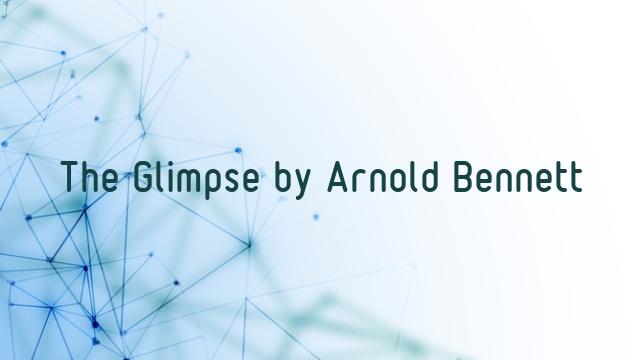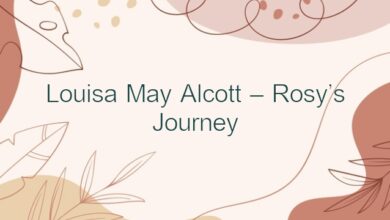
The Glimpse by Arnold Bennett
I
When I was dying I had no fear. I was simply indifferent, partly, no doubt, through exhaustion caused by my long illness. It was a warm evening in August. We ought to have been at Blackpool, of course, but we were in my house in Trafalgar Road, and the tramcars between Hanley and Bursley were shaking the house just as usual. Perhaps not quite as usual; for during my illness I had noticed that a sort of tiredness, a soft, nice feeling, seems to come over everything at sunset of a hot summer’s day. This universal change affected even the tramcars, so that they rolled up and down the hill more gently. Or it may have been merely my imagination. Through the open windows I could see, dimly, the smoke of the Cauldon Bar Iron Works slowly crossing the sky in front of the sunset. Margaret sat in my grandfather’s oak chair by the gas-stove. There was only Margaret, besides the servant, in the house; the nurse had been obliged to go back to Pirehill Infirmary for the night. I don’t know why. Moreover, it didn’t matter.
I began running my extraordinarily white fingers along the edge of the sheet. I was doing this quite mechanically when I noticed a look of alarm in Margaret’s face, and I vaguely remembered that playing with the edge of the sheet was supposed to be a trick of the dying. So I stopped, more for Margaret’s sake than for anything else. I could not move my head much, in fact scarcely at all; hence it was difficult for me to keep my eyes on objects that were not in my line of vision as I lay straight on my pillows. Thus my eyes soon left Margaret’s. I forgot her. I thought about nothing. Then she came over to the bed, and looked at me, and I smiled at her, very feebly. She smiled in return. She appeared to me to be exceedingly strong and healthy. Six weeks before I had been the strong and healthy one–I was in my prime, forty, and had a tremendous appetite for business–and I had always regarded her as fragile and delicate; and now she could have crushed me without effort! I had an unreasonable, instinctive feeling of shame at being so weak compared to her. I knew that I was leaving her badly off; we were both good spenders, and all my spare profits had gone into the manufactory; but I did not trouble about that. I was almost quite callous about that. I thought to myself, in a confused way: “Anyhow, I shan’t be here to see it, and she’ll worry through somehow!” Nor did I object to dying. It may be imagined that I resented death at so early an age, and being cut off in my career, and prevented from getting the full benefit of the new china-firing oven that I had patented. Not at all! It may be imagined that I was preoccupied with a future life, and thinking that possibly we had given up going to chapel without sufficient reason. No! I just lay there, submitting like a person without will or desires to the nursing of my wife, which was all of it accurately timed by the clock.
I just lay there and watched the gradual changing of the sky, and, faintly, heard clocks striking and the quiet swish of my wife’s dress. Once my ear would have caught the ticking of our black marble clock on the mantelpiece; but not now–it was lost to me. I watched the gradual changing of the sky, until the blue of the sky had darkened so that the blackness of the smoke was merged in it. But to the left there appeared a faint reddish glare, which showed where the furnaces were; this glare had been invisible in daylight. I watched all that, and I waited patiently for the last trace of silver to vanish from a high part of the sky above where the sunset had been–and it would not. I would shut my eyes for an age, and then open them again, and the silver was always in the sky. The cars kept rumbling up the hill and bumping down the hill. And there was still that soft, languid feeling over everything. And all the heat of the day remained. Sometimes a waft of hot air moved the white curtains. Margaret ate something off a plate. The servant stole in. Margaret gave a gesture as though to indicate that I was asleep. But I was not asleep. The servant went off. Twice I restrained my thin, moist hands from playing with the edge of the sheet. Then I closed my eyes with a kind of definite closing, as if finally admitting that I was too exhausted to keep them open.
II
Difficult to describe my next conscious sensations, when I found I was not in the bed! I have never described them before. You will understand why I’ve never described them to my wife. I meant never to describe them to anyone. But as you came all the way from London, Mr Myers, and seem to understand all this sort of thing, I’ve made up my mind to tell you for what it’s worth. Yes, what you say about the difficulty of sticking to the exact truth is quite correct. I feel it. Still, I don’t think I over-flatter myself in saying that I am a more than ordinarily truthful man.
Well, I was looking at the bed. I was not in the bed. I can’t be precisely sure where I was standing, but I think it was between the two windows, half behind the crimson curtains. Anyhow, I must have been near the windows, or I couldn’t have seen the foot of the bed and the couch that is there. I could most distinctly hear Cauldon Church clock, more than two miles away, strike two. I was cold. Margaret was leaning over the bed, and staring at a face that lay on the pillows. At first it did not occur to me that this face on the pillows was my face. I had to reason out that fact. When I had reasoned it out I tried to speak to Margaret and tell her that she was making a mistake, gazing at that thing there on the pillows, and that the real one was standing in the cold by the windows. I could not speak. Then I tried to attract her attention in other ways; but I could do nothing. Once she turned sharply, as if startled, and looked straight at me. I strove more frantically than ever to make signs to her; but no, I could not. Seemingly she did not see.
Then I thought: “I’m dead! This is being dead! I’ve died!”
Margaret ran to the dressing-table and picked up her hand-mirror. She rubbed it carefully on the counterpane, and then held it to the mouth and nostrils of that face on the pillows, and then examined it under the gas. She was very agitated; the whole of her demeanour had changed; I scarcely recognized her. I could not help thinking that she was mad. She put down the mirror, glanced at the clock, even glanced out of the window (she was much closer to me than I am now to you), and then flew back to the bed. She seized the scissors that were hanging from her girdle, and cut a hole in the top pillow, and drew from it a flock of down, which she carefully placed on the lips of that face. The down did not even tremble. Then she bared the breast of the body on the bed, and laid her ear upon the region of the heart; I could see her eyes blinking as she listened intensely. After she had listened some time she raised her head, with a little sob, and frantically pulled the bell-rope. I could hear the bell; we could both hear it. There was no response; nothing but a fearful silence. Margaret, catching her breath, rushed out of the room. I was sick with the most awful disgust that I could not force her to see where I was. I had been helpless before, when I lay in the bed, but I was far more completely helpless now. Talk about the babe unborn!
She came back with the servant, and the two women stood on either side of the bed, gazing at that body. The servant whispered:
“They do say that if you put a full glass of water on the chest you can tell for sure.”
Margaret hesitated. However, the servant began to fill a glass of water on the washstand, and they poised it on the chest of that body. Not the slightest vibration troubled its surface. I was–not angry; no, tremendously disgusted is the only term I can use–at all this flummery with that body on the bed. It was shocking to me that they should confuse that body with me. I thought them silly, wilfully silly. I thought their behaviour monstrously blind. There was I, the master of the house, standing chilled between the windows, and neither Margaret nor the servant would take the least notice of me!
The servant said:
“I’d better run for the doctor, ma’am.” And she lifted off the glass.
“What use can the doctor be?” Margaret asked. “Only spoil the poor man’s night for nothing. And he’s had a lot of bad nights lately. He told me to be–prepared.”
The servant said:
“Yes, mum.. But I’d better run for him. That’s what doctors is for.”
As soon as the front-door banged on the excited servant, my wife fell on that body with a loud cry, and stroked it passionately, and I could see her tears dropping on it. She wept without any restraint. She loved me very much; I knew that. But the fact that she loved me only increased my horror that she should be caressing that body, which was not me at all, which had nothing whatever to do with me, which was loathsome, vile, and as insensible as a log to the expressions of her love. She was not weeping over me. She was weeping over an abomination. She was all wrong, all tragically wrong, and I could not set her right. Her woe desolated me. We had been happy together for sixteen years. Her error desolated me, as a painful farce. But a slow, horrible change in my own consciousness made me forget her grief in my own increasing misery.
III
I do not suppose that the feeling which came over me is capable of being described in human language. It can only be hinted at, not truly conveyed. If I say that I was utterly overcome by the sensation of being cut off from everything, I shall perhaps not impress you very much with a notion of my terror. But I do not see how I can better express myself. No one who has not been through what I have been through–it is a pretty awful thought that all who die do probably go through it–can possibly understand the feeling of acute and frightful loneliness that possessed me as I stood near the windows, that wrapped me up and enveloped me, as it were, in an icy sheet. A few people in England are possibly in my case–they have been, and they have returned, like me. They will understand, and only they. I was solitary in the universe. I was invisible, and I was forgotten. There was my poor wife lavishing her immense sorrow on that body on the bed, which had ceased to have any connection with me, which was emphatically not me, and to which I felt the strongest repugnance. I was even jealous of that lifeless, unresponsive, decaying mass. You cannot guess how I tried to yell to my wife to come to me and warm me with her companionship and her sympathy–and I could accomplish nothing, not the faintest whisper.
I had no home, no shelter, no place in the world, no share in life. I was cast out. The changeless purposes of nature had ejected me from humanity. It was as though humanity had been a fortified city and the gates had been shut on me, and I was wandering round and round the unscalable smooth walls, and beating against their stone with my hands. That is a good simile, except that I could not move. Of course if I could have moved I should have gone to my wife. But I could not move. To be quite exact, I could move very slightly, perhaps about an inch or two inches, and in any direction, up or down, to left or right, backwards or forwards; this by a great straining, fatiguing effort. I was stuck there on the surface of the world, desolate and undone. It was the most cruel situation that you can imagine; far worse, I think, than any conceivable physical torture. I am perfectly sure that I would have exchanged my state, then, for the state of no matter what human being, the most agonized martyr, the foulest criminal. I would have given anything, made any sacrifice, to be once more within the human pale, to feel once more that human life was not going on without me.
There was a knocking below. My wife left that body on the bed, and came to the window and put her head out into the nocturnal, gas-lit silence of Trafalgar Road. She was within a foot of me–and I could do nothing.
She whispered: “Is that you, Mary?”
The voice of the servant came: “Yes, mum. The doctor’s been called away to a case. He’s not likely to be back before five o’clock.”
My wife said, with sad indifference: “It doesn’t matter now. I’ll let you in.”
She went from the room. I heard the opening and shutting of the door. Then both women returned into the room, and talked in low voices.
My wife said: “As soon as it’s light you must …” She stopped and corrected herself. “No, the nurse will be back at seven o’clock. She said she would. She will attend to all that. Mary, go and get a little rest, if you can.”
“Aren’t you going to put the pennies on his eyes, mum?” the servant asked.
“Ought I?” said my wife. “I don’t know much about these things.”
“Oh, yes, mum. And tie his jaw up,” the servant said.
His eyes! His jaw! I was terribly angry, in my desolation. But it was a futile anger, though it raged through me like a storm. Could they not understand, would they never understand, that they were grotesquely deceived? How much longer would they continue to fuss over that body on the bed while I, I, the person whom they were supposed to be sorry for, suffered and trembled in dire need just behind them?
A ridiculous bother over pennies! There was only one penny in the house, they decided, after searching. I knew the exact whereabouts of two shillings worth of copper, rolled in paper in my desk in the dining-room. It had been there for many weeks; I had brought it home one day from the works. But they did not know. I wanted to tell them, so as to end the awful exacerbation of my nerves. But of course I could not. In spite of Mary’s superstitious protest, my wife put a penny on one eye and half-a-crown on the other. Mary seemed to regard this as a desecration, or at best as unlucky. Then they bound up the jaw of that body with one of my handkerchiefs. I thought I had never seen anything more wantonly absurd. Their trouble in straightening the arms–the legs were quite straight–infuriated me. I wanted to weep in my tragic vexation. It seemed as though tears would ease me. But I could not weep.
The servant said: “You’d better come away now, mum, and rest on the sofa in the drawing-room.”
Margaret, with red-bordered, glittering eyes, answered, staring all the while at that body: “No, Mary. It’s no use. I can’t leave him. I won’t leave him!”
But she wasn’t thinking about me at all. There I was, neglected and shivering, near the windows; and she would not look at me!
After an interminable palaver Margaret induced the servant to leave the room. And she sat down on the chair nearest the bed, and began to cry again, not troubling to wipe her eyes. She sobbed, more and more loudly, and kept touching that body. She seized my gold watch, which hung over the bed, and which she wound up every night, and kissed it and put it back. Her sobs continued to increase. Then the door opened quietly, and the servant, half-undressed, crept in, and without saying a word gently led Margaret out of the room. Margaret’s last glance was at that body. In a moment the servant returned and extinguished the gas, and departed again, very carefully closing the door. I was now utterly abandoned.
IV
All that had happened to me up to now was strange; but what followed was still more strange and still less capable of being described in human language.
I became aware that I was gradually losing the sensation of being cut off from intercourse, at any-rate that the sensation was losing its painfulness. I didn’t seem to care, now, whether I was neglected or not. And to be cast out from humanity grew into a matter of indifference to me. I became aware, too, of the approach of a mysterious freedom. I was not free, I could still move only an inch or so in any direction; but I felt that a process of dissolving of bonds had begun. What manner of bonds? I don’t know. I felt–that was all. My indifference slowly passed into a sad and deep pity for the world. The world seemed to me so pathetic, so awry, so obstinate in its honest illusions, so silly in its dishonest pretences. “Have I been content with that?” I thought, staggered. And I was sorry for what I had been. I perceived that the ideals of my life were tawdry, that even the best were poor little things. And I perceived that it was the same with everyone, and that even the greatest men, those men that I had so profoundly admired as of another clay than mine, were as like the worst as one sheep was like another sheep. Weep–because nature had ejected me from that petty little world, with its ridiculous and conceited wrongness? What an idea! Why, I said to myself, that world spends nearly the whole of its time in moving physical things from one place to another. Change the position of matter–that is all it does, all it thinks of. I remembered a statesman who had referred to the London and North-Western Railway as being one of the glories of England! Parcels! Parcels! Parcels, human, brute, insensate! Nothing but parcel-moving! I smiled. And then I perceived that I could understand and solve problems which had defied thousands of years of human philosophy, problems which we on earth called fundamental. And lo! They were not in the least fundamental, but were trifles, as simple as Euclid. It was surprising that the solution of them had not presented itself to me before! I thought: With one word, one single word, I could enlighten the human race beyond all that it has ever learned. Feeble-bodied, feeble-minded humanity!
And then I had a glimpse…. I was in the bedroom, near the windows, all the time, but nevertheless I was nowhere, nowhere in space. I could feel the roll of the earth as it turned lumberingly on its axis–a faint shaking which did not affect me. Still, I was in the bedroom, near the windows. And I had a glimpse…. The heralds of a new vitality swept trumpeting through me, and a calm, intense, ineffable joy followed in their train. I had a glimpse…. And my eyes were not dazzled. I yearned and strained towards what I saw, towards the exceeding brightness of undreamt companionships, hopes, perceptions, activities, and sorrows. Yes, sorrows! But what noble sorrows they were that I felt awaited me there! I strained at my mysterious bonds. It seemed that they were about to break and that I should be winged away into other dimensions….
And then, I knew that they were tightening again, and the brightness very slowly faded, and I lost faith in the gift of vision which momentarily had enabled me to see the illusions and the littleness of the world. And I was slowly, slowly drawn away from the window…. And then I felt heavy weights on my eyes, and I could not move my jaw. I shuddered convulsively, and a coin struck the floor and ran till it fell flat. And the door swiftly opened….
V
Yes, my whole character is changed, within; though externally it may seem the same. Externally I may seem to have resumed the affections and the interests which occupied me before my illness and my remarkable recovery. Yet I am different. Certainly I have lost again the strange transcendental knowledge which was mine for a few instants. Certainly I have descended again to the earthly level. All those magic things have slipped away, except hope. In a sure hope, in a positive faith, I am waiting. I am waiting for all that magic to happen to me again. I know that the pain of loneliness, when again I shall see my own body from the outside, will be exquisite, but–the reward! The reward! That is what is always at the back of my mind, the source of the calm joy in which I wait. Externally I am the successful earthenware manufacturer, happily married, getting rich on a china-firing oven, employing a couple of hundred workmen, etcetera, who was once given up for dead. But I am more than that. I have seen God.





